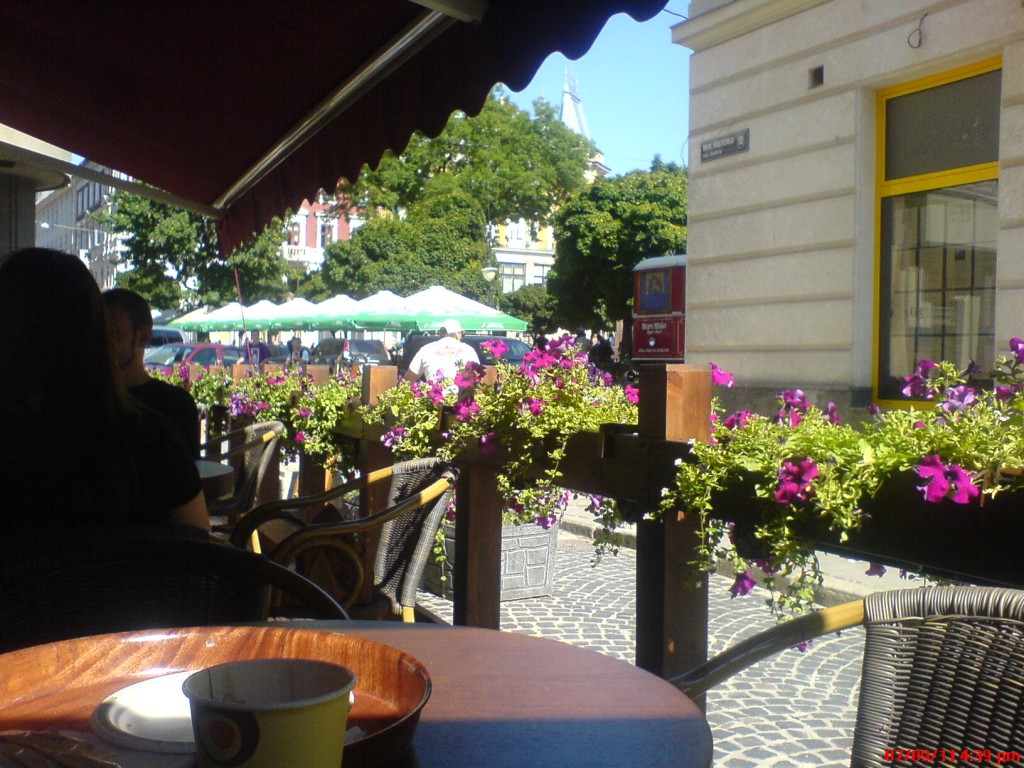
After a couple of months in Ukraine I began to slowly accept the country as it is, for better and worse. I got used to some things, especially after living in Kharkiv for a few months, and yet just couldn’t understand some other aspects of the country and its culture. What follows are my second impressions of Ukraine. You can read about my first impressions here.
My favourite Russian word is “Da” (Да), “yes”. Why? It’s simpler and much more gutteral than the Ukrainian “tak” (так). In one simple groan I could agree to just about anything, “DA!”, and carry on. When I didn’t understand my students (which wasn’t as often as they misunderstood me), I’d put on my international diplomatic smile and say… “Da!”
People are coming to Ukraine to study… Russian? I guess so, it’s a cheaper, littler, Russia particularly as you go further east. I was surprised by the amount of people who said they had come to Ukraine to study Russian. Even most of my fellow travellers associated the country Ukraine with the Russian language with nary a thought of the country’s official language, Ukrainian. I particularly remember one hostel worker being dismayed at the thought that so many foreigners didn’t know any Ukrainian yet knew Russian phrases in his country. It’s as if Russian is slowly displacing Ukrainian as the language of Ukraine.
Now I understand the difference between cities like Warsaw and Krakow or Kyiv and Lviv. Warsaw and Kyiv, both capital cities of their respective nations, have been remodelled and modernized more than their widely accepted more beautiful and cultural cities of Krakow or Lviv. I was told before going to Lviv that it was very similar to Krakow. Go figure, I had the same reaction to Lviv as I did Krakow: cramped, dirty, old. And my reaction to Kyiv was similar to Warsaw: big, modern, thriving pulse.
Don’t eat the kubasa, eat pure pig fat (“salo” or сало) instead. The rational here, after some thinking, makes sense. The cheap kubasa that is sold in the supermarket is mass produced, hello processing plants! Some pointers on buying meat in Ukraine:
1) Don’t buy the kubasa from Billa or Target or Metro, etc., go into the markets and ask for the some good kubasa. “Good” kubasa will run over 100 HVN (~$12). Anything less, I’m told, and you’re eating paper and dead animal parts… kinda like our North American hot dogs.
2) Pure pig fat. Salo. And this confused me for a good portion of my first month here in Ukieland. Instead of eating kubasa which, I think, is made in the same fashion as Western processing plants, salo is reportedly pure pig. As in, the farmer hacked off a piece of the pig’s back and sent it to market. That’s right, imagine if a pig were to run by you and you just took out a knife and sliced off a piece. That’s salo. That’s “natural.” And it’s fucking good. Think bacon, except thicker and juicer. Two ways to prepare it. Cold: get some “black bread”, garlic and maybe even some chocolate and add a slice of salo on top of that. Or, hot: cook up some garlic and onions and throw on a few boiled verehneky and you’re going to get down to some good eatin’. Mmm good! Really good! Good for me! Good for you!
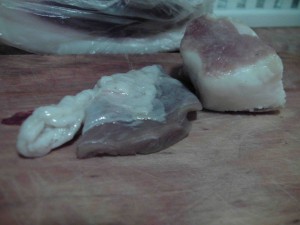

Verheneky (pictured above with salo). My students made me aware that eating kubasa (even the expensive kind) and verehneky every night is bad for your health. I should eat more fruits and vegetables. To which I respond, I’m a single man, I don’t cook. And it’s true. To me, cooking is heating up verheneky and kubasa.
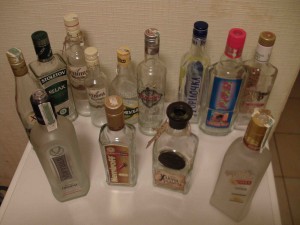 Vodka. I was looking forward to sampling the many types of vodka Ukraine is renowned to stock. However, my enthusiasm was dampened, yet again, by my students. There are 3 distillers in all of Ukraine and they make all of the vodka. Same with the beer. My students tell me that Ukrainian vodka is all the same, just different labels. Allowing for some comedy, I accept what they’re saying with a grain of salt, opting to believe that what they mean is that many of the vodkas have no distinctive taste like Polish or Finnish vodkas. It doesn’t seem wrong to conclude that in Poland you drink vodka, in Ukraine you drink beer.
Vodka. I was looking forward to sampling the many types of vodka Ukraine is renowned to stock. However, my enthusiasm was dampened, yet again, by my students. There are 3 distillers in all of Ukraine and they make all of the vodka. Same with the beer. My students tell me that Ukrainian vodka is all the same, just different labels. Allowing for some comedy, I accept what they’re saying with a grain of salt, opting to believe that what they mean is that many of the vodkas have no distinctive taste like Polish or Finnish vodkas. It doesn’t seem wrong to conclude that in Poland you drink vodka, in Ukraine you drink beer.
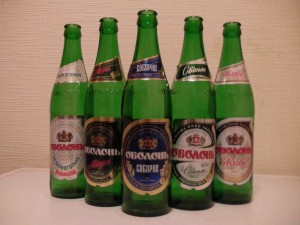
There is a similar argument for the beers of Ukraine. Although there are such world-renowned Ukrainian beers such as Slavutych, Obolon’ and Lvivsky, I’m told the good beer gets exported while the shit beer stays here in Ukraine. I’m not sure how to verify this since many of my students have not been to Canada or abroad, meaning that they don’t really know what gets exported. So I don’t know how to weigh in on this one just yet.
And don’t drink the tap water, it’s said to contain all sorts of wonderful heavy elements and dirty poop thanks to radiation leakage from Chernobyl’s nuke reactor and years of neglect. The best water to buy is Morshinska, available in 6 litre jugs… though some folks also questioned whether or not it really comes from the Carpathians.
Ukraine reminds me of Cambodia and Vietnam: poverty everywhere. And after having visited Poland, I can’t help but think that Ukraine just isn’t going to survive. Some day it will be cut in two. Lviv will either become a sovereign country or rejoin Poland. Western Ukraine, either a sovereign state or join Russia. Either way, Ukraine is not unified, the people don’t want to be here, and it’s depressing as ever being Canadian knowing full well that my grandparents decided to leave this country and ended up staying in Canada.
After being in the country for only a few months and being completely dismayed and culture shocked by the whole experience, I started looking for sources of inspiration, something to rejuvenate that initial desire to come to Ukraine. Maybe some humour in the situation or some articles that would at least help explain the country as it stands today but by someone who’s been there a while. And that’s when I came across TryUkraine.com. I can recommend a few articles for those who want to go to Ukraine or those who have been and left just as confused as I was.
Forget the Lonely Planet series on Ukraine. Although they recently published a new book, Try Ukraine offers the best (and cheapest) information on Ukraine. This post gives a pretty good overview of what you can expect in Ukraine. I highly recommend starting off with this one:
http://www.tryukraine.com/info/ukraine.shtml
The first is about languages and how English is changing because of all the folks worldwide trying to learn the language, but never becoming fully fluent. It’s a good take on the current situation regarding the Ukrainian/Russian language debate. I think it matters most to folks outside of Ukraine, particularly part of the “diaspora” (first generation emigrants from Ukraine) and anybody interested in how an emerging country develops its own identity after being dominated from outside for so long.
http://www.tryukraine.com/society/ukrainization.shtml
and
http://www.tryukraine.com/info/languages.shtml
And with my second impressions changing in some regard, I posted up in Kharkiv for a few months.
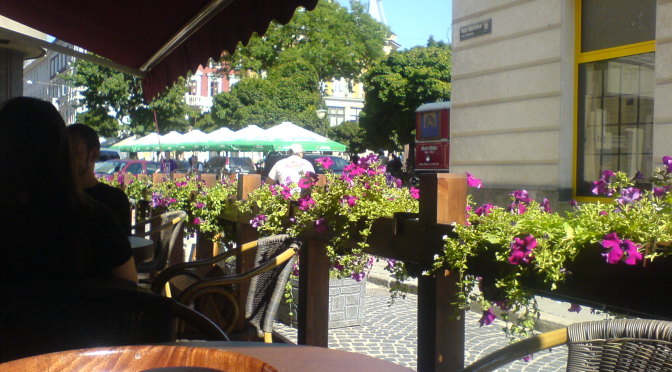
Comments
4 Responses to “Ukraine: Second Impressions”
Interesting take on Ukraine. I have a friend whose been there for the past 2 years as a Peace Corps volunteer, and she, too, has comments on some of the elements of culture shock that you have. It’s always interesting to read posts like this, though, as Ukraine is a country I definitely know very little about.
Found your other post, Amanda. 😛 Sorry for the mix up!
I just tried posting a comment but it didn’t show up… so I’ll try again.
This post was interesting for me, considering how very little I know about Ukraine. I have a friend who’s been living there for the past 2 years as a Peace Corps volunteer, though, and she’s shared similar examples of culture shock to the ones you’ve listed here. It seems like a tough country to get anything done in. But I like learning new things about countries I don’t know much about, so I appreciated this honest look at Ukraine.
Hi Amanda, thanks for posting. We’ve been having trouble with comments as of late so I apologize for the inconvenience.
Ukraine is a tough country and not for the faint of heart. When I was undergoing teacher training in Kyiv, one of the students turned to me and said “Steve, in Ukraine, you need strong character.” And he was right. That being said, I believe it’s changing. I’ve known quite a few folks who’ve gone to Ukraine before me and told me what it’s like. I can’t help but think that the country is rapidly developing. Although it was shocking to me at the time, it both excites me and makes me want to go again. I guess Ukraine is like drugs or coffee. 😛